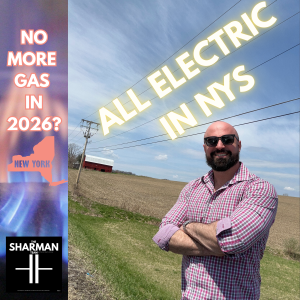
If you’re planning to build a new home in New York, or invest in new construction, there’s a major law you need to know about, because it could change everything.
Starting in 2026, most new homes in New York will be required by law to go all-electric. That means no gas hookups. No propane. No oil heat. Just electricity.
This bold move is part of New York’s aggressive push to fight climate change and reduce building-related emissions—but for buyers, builders, and investors, it also means significant changes to how homes are designed, powered, and sold.
Let’s break down what’s changing, when it starts, who’s affected, and what it means for your real estate plans.
What the New Law Says
In 2023, New York State passed the All-Electric Buildings Act as part of its state budget. The law requires most new buildings to be constructed without any fossil fuel systems. Instead, all major systems must be electric.
Here’s the timeline:
| Effective Date | Who It Affects |
|---|---|
| January 1, 2026 | New residential buildings 7 stories or fewer (includes most single-family homes) |
| December 31, 2028 | All other new buildings (commercial, multi-story, large-scale residential) |
If a building permit is filed after these dates, no fossil fuel systems can be used.
What Does “All-Electric” Mean?
In simple terms: no gas or oil. Period.
New homes must use electric-only systems for:
-
Heating and cooling (heat pumps, not gas furnaces)
-
Water heating (electric or hybrid heat pump water heaters)
-
Cooking (induction or electric ranges only)
-
Clothes drying (electric dryers)
Gas stoves, propane tanks, oil burners, or anything similar will no longer be legal in new builds after the law kicks in.
Are There Any Exceptions?
Yes, but they’re narrow. Exemptions include:
-
Emergency backup generators
-
Industrial buildings or certain commercial uses
-
Agricultural buildings
-
Projects with permits already approved before the deadlines
-
Cases where the electrical grid cannot accommodate full electrification (must be approved by NY’s Public Service Commission)
For 99% of new homes, though, the law will apply.
Why Is This Happening?
According to the law data, buildings are responsible for over 30% of New York’s emissions, mostly from gas furnaces, hot water heaters, and cooking appliances.
By requiring new construction to be electric-only, the state’s intention is to:
-
Reduce emissions
-
Improve indoor air quality
-
Prepare homes for solar and battery storage
-
Move toward a carbon-neutral energy grid
How Will This Affect Homeowners, Buyers, and Builders?
If you’re in the market for new construction, this law affects you directly.
Here’s how:
-
Builders will need to use all-electric systems starting in 2026
-
Buyers should expect electric heat pumps and induction stoves as standard
-
Gas lines will not be available for new homes after the deadlines
-
Existing homes are NOT affected (you can keep your gas furnace or stove)
-
Renovations are not subject to this law unless it’s a full teardown and rebuild
Will This Increase Construction Costs?
Upfront costs for electric systems may be slightly higher depending on the build, but the long-term operating costs are often lower, especially when paired with solar or high-efficiency heat pumps.
Electric homes are supposed to have:
-
Fewer carbon monoxide risks
-
Lower maintenance costs
-
Better indoor air quality
Real Estate Takeaway: All-Electric Homes Are the Future
Whether you love it or hate it, the shift to all-electric homes is happening and it’s the law for the time being.
If you’re planning to build, buy, or develop after 2025, you’ll need to factor in electric-only infrastructure from day one. That includes everything from HVAC planning to appliance selection to utility access.
And for buyers looking at existing homes with gas-those properties could become more desirable in the short term as builders adjust to the new requirements.
Need Help Navigating the Change?
As a local real estate expert, I keep my clients ahead of the curve-especially when policies like this impact how and where to build or buy.
If you’re a homeowner, investor, or builder looking for guidance on how this new law affects your plans, reach out anytime. Let’s talk strategy.
Matthew Sharman
The Sharman Team @ Empire Realty Group
Livingston, Wyoming, Ontario, Genesee, Monroe, Orleans Counties
(585) 727-0980